Zelenskiy says Crimea bridge a legitimate target
Volodymyr Zelenskiy has said the bridge linking the Crimea peninsula to Russia “brings war not peace” and is therefore a military target.
Explosions on the road bridge on Monday killed two civilians and put part of it out of service, after it only recently returned to full operation following damage in a similar attack in October.
Reuters reports that the Ukrainian president said the road and rail bridge was “not just a logistical road”. Zelenskiy told the Aspen security conference in the US via videolink:
This is the route used to feed the war with ammunition and this is being done on a daily basis. And it militarises the Crimean peninsula.
For us, this is understandably an enemy facility built outside international laws and all applicable norms. So, understandably, this is a target for us. And a target that is bringing war, not peace, has to be neutralised.
Ukraine welcomed Monday’s attack on the bridge – built by Russia and brought into service in 2018 – but officials did not directly claim responsibility. Moscow blamed Ukraine.
Key events
The US plans to announce a new military aid package for Ukraine worth up to $400m as Ukraine’s counteroffensive grinds on, Reuters reports three US officials as saying.
The US was not including cluster munitions in this weapons assistance package, said two of the officials, who spoke on condition of anonymity.
The package primarily comprised of artillery, air defence missiles and ground vehicles and could be announced as soon as Tuesday, the officials said.
The US first sent dual-purpose improved conventional munitions, a cluster munition fired from a 155mm Howitzer cannon, to Ukraine earlier in July.
Included in the package are several Stryker armored personnel carriers, mine clearing equipment, munitions for national advanced surface-to-air missile systems (Nasams), munitions for high mobility artillery rocket systems (Himars), anti-tank weapons and munitions for Patriot and Stinger anti-aircraft systems, according to the officials.
The package was still being finalised and could change, they said.
Russian arrest of pro-war blogger likely to trigger fury in military, says UK MoD
Russia’s arrest of Igor Girkin, a former Russian intelligence officer and leading nationalist military blogger, will probably infuriate elements in the military as well as his fellow bloggers, according to UK intelligence.
The Ministry of Defence said in its latest intelligence update that Girkin had long been a critic of the Russian defence ministry’s conduct of the war in Ukraine, but that in recent days his comments “turned to direct criticism of Russian president Vladimir Putin and his time in power”.
The former former battlefield commander of Russia’s proxy forces in eastern Ukraine, who was convicted by a Dutch court over the shooting down of MH17, was arrested on “extremism” charges on Friday.

The UK ministry said in its update, posted on Twitter, that Girkin’s arrest “is likely to infuriate fellow members of the mil-blogger community – and elements within the serving military – who largely see Girkin as an astute military analyst and patriot”.
Girkin had played a major role in Russia’s war in the Donbas from 2014 and spent months on the frontline last year, it said.
While Girkin is no ally of the Wagner Group, he was likely only prepared to push the limits of public criticism in the context of Wagner chief Yevgeny Prigozhin’s June 2023 abortive mutiny. The taboo against unmasked criticism of the Putin regime has significantly weakened.
Russia has come under pressure at the UN security council from its ally China and developing countries as well as western nations to avert a global food crisis and quickly revive Ukrainian grain shipments.
Associated Press reports that Moscow was also criticised by the UN and council members on Friday for attacking Ukrainian ports after pulling out of the year-old grain deal and destroying port infrastructure.
In response to Russia declaring wide areas in the Black Sea dangerous for shipping, the UN warned that a military incident in the sea could have “catastrophic consequences”.
China’s deputy UN ambassador, Geng Shuang, expressed hope that Russia and the UN would work together to resume exports from both countries “at an early date” in the interest of “maintaining international food security and alleviating the food crisis in developing countries in particular”.
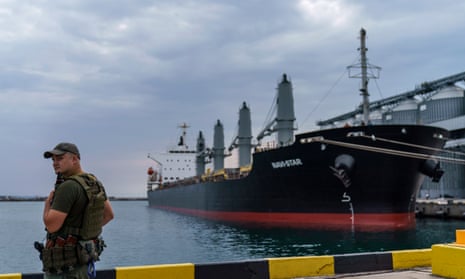
UN political chief Rosemary DiCarlo strongly condemned Russian attacks on Ukraine’s Black Sea ports and urged Moscow to stop them immediately. She said threats to target civilian vessels “are unacceptable” and warned that sea mines could endanger civilian navigation.
She said:
We strongly urge restraint from any further rhetoric or action that could deteriorate the already dangerous situation. Any risk of conflict spillover as a result of a military incident in the Black Sea – whether intentional or by accident – must be avoided at all costs, as this could result in potentially catastrophic consequences to us all.
Russia said it had suspended the Black Sea grain initiative because the UN had failed to overcome obstacles to shipping its food and fertiliser to global markets, the other half of the Ukraine grain deal.
Russia pounded Ukrainian food export facilities for a fourth day in a row on Friday and practised seizing ships in the Black Sea in an escalation of what western leaders say is an attempt to wriggle out of sanctions by threatening a global food crisis.
Reuters reports that the attacks on Ukraine’s grain, a major part of the global food chain, followed a vow by Kyiv to defy Russia’s naval blockade on its export ports after Moscow’s withdrawal this week from a UN-brokered safe sea corridor agreement.
The UN warned that millions of people in poor countries around the world were at greater risk of hunger and starvation from the knock-on effect for food prices.
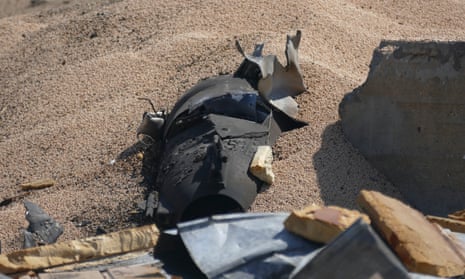
UN aid chief Martin Griffiths told the security council:
Some will go hungry, some will starve, many may die as a result of these decisions.
In Ukraine, local governor Oleh Kiper said the grain terminals of an agricultural enterprise in Odesa region were hit by air, with 100 tons of peas and 20 tons of barley destroyed.
Photographs released by the emergencies ministry showed a fire burning among crumpled metal buildings that appeared to be storehouses. Two people were injured, Kiper said, while officials reported seven dead in Russian air strikes elsewhere in Ukraine.
Zelenskiy says Crimea bridge a legitimate target
Volodymyr Zelenskiy has said the bridge linking the Crimea peninsula to Russia “brings war not peace” and is therefore a military target.
Explosions on the road bridge on Monday killed two civilians and put part of it out of service, after it only recently returned to full operation following damage in a similar attack in October.
Reuters reports that the Ukrainian president said the road and rail bridge was “not just a logistical road”. Zelenskiy told the Aspen security conference in the US via videolink:
This is the route used to feed the war with ammunition and this is being done on a daily basis. And it militarises the Crimean peninsula.
For us, this is understandably an enemy facility built outside international laws and all applicable norms. So, understandably, this is a target for us. And a target that is bringing war, not peace, has to be neutralised.
Ukraine welcomed Monday’s attack on the bridge – built by Russia and brought into service in 2018 – but officials did not directly claim responsibility. Moscow blamed Ukraine.
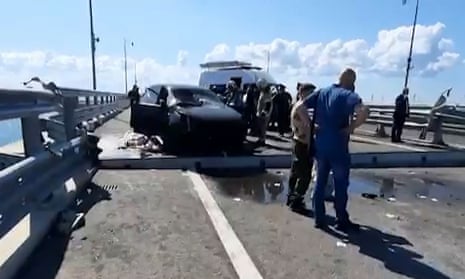
Opening summary
Welcome back to our continuing live coverage of Russia’s war in Ukraine. This is Adam Fulton and here’s a roundup of the latest key developments.
Volodymyr Zelenskiy has said a road bridge linking the Crimea peninsula to Russia “brings war not peace” and is therefore a military target that “has to be neutralised”.
The Ukrainian president’s comments followed blasts on the bridge that killed two civilians on Monday.
Russia, meanwhile, continued to hit Ukrainian food export facilities for a fourth day on Friday and practised seizing ships in the Black Sea in an escalation of what western leaders say is a bid to get out of sanctions by threatening a global food crisis.
UN political chief Rosemary DiCarlo condemned the Russian attacks on Ukraine’s Black Sea ports, saying: “Any risk of conflict spillover as a result of a military incident in the Black Sea – whether intentional or by accident – must be avoided at all costs, as this could result in potentially catastrophic consequences to us all.”
More on those stories shortly. In other news:
-
Russia is “waging war on the world’s food supply” and has “upended peace and security around the world”, the US ambassador to the UN has a told a meeting of the security council. Linda Thomas-Greenfield called on Moscow to cease attacking Ukrainian food facilities and reenter the Black Sea grain deal, from which it withdrew on Monday. “Russia has zero legitimate reason to suspend its participation in this arrangement … It is using the Black Sea as blackmail.”
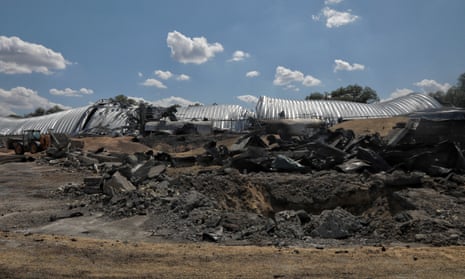
-
Vladimir Putin has said Russia will use “all means at its disposal” to defend Belarus after Poland and other EU countries voiced concerns about the deployment of Russian paramilitaries near their borders. The Russian president claimed at a meeting of the Russian security council that Poland was seeking to invade Belarus, a Russian ally, after Warsaw moved troops nearer the border with Belarus following Minsk’s commencement of exercises with Wagner trainers.
-
Russia has arrested Igor Girkin, who was convicted by a Dutch court over the shooting down of MH17, on extremism charges, probably fuelled by his criticism of the Russian war effort in Ukraine. Girkin is a former battlefield commander of Moscow’s proxy forces in eastern Ukraine.
-
Russia’s navy carried out a live fire “exercise” in the north-west Black Sea, Moscow’s defence ministry said, days after the Kremlin said it would consider ships travelling to Ukraine through the waterway to be potential military targets. The Black Sea Fleet “carried out live firing of anti-ship cruise missiles at the target ship in the combat training range in the north-western part of the Black Sea”, Russia’s defence ministry said in a statement on Telegram.
-
The Ukrainian president condemned a Russian artillery attack he said killed two children and damaged a school in the Donetsk region. Volodymyr Zelenskiy said a cultural centre and residential buildings were also damaged in the attack on Druzhba village.
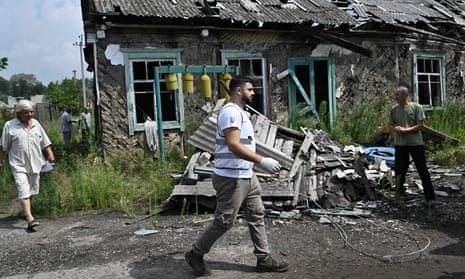
-
An employee of a cultural centre had been found dead after Russian shelling in the Chernihiv region of northern Ukraine, governor Vyacheslav Chaus said. In the Odesa region, governor Oleh Kiper said that out of 21 people wounded in Russian attacks over the past four days, four were still in hospital.
-
The number of ships looking to pick up grain cargoes from the Black Sea area fell 35% week on week amid growing uncertainty over whether commercial traffic could be hit as Russia continues to pound food facilities in Ukraine.
-
Bulgaria said it had decided to send about 100 armoured personnel carriers to Ukraine in the Balkan country’s first shipment of heavy equipment to Kyiv. Bulgaria has so far sent only one military aid package to Kyiv, containing mostly flak jackets and helmets, but a pro-EU government took office last month.
-
The top diplomatic adviser to Emmanuel Macron, the French president, said China was delivering to Russia items that could be used as military equipment, although not on a big scale. French officials told CNN that Macron was referring to dual-use technologies and non-lethal assistance, such as helmets and body armour.
-
Moscow’s Bolshoi Ballet, grounded by Covid-19 and then shunned in the west since Russia’s invasion of Ukraine, will return to international touring next week for the first time since 2020 with a trip to Beijing.

